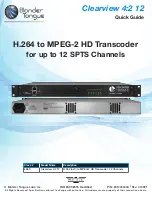
WARNING:
READ BEFORE INSTALLATION
Fluid hammer and surges can destroy any pressure transmitter/transducer
and must always be avoided. A pressure snubber should be installed to
eliminate the damaging hammer effects.
Fluid hammer occurs when a liquid flow is suddenly stopped, as with
quick closing solenoid valves. Surges occur when flow is suddenly begun,
as when a pump is turned on at full power or a valve is quickly opened.
Liquid surges are particularly damaging to pressure transmitter/trans-
ducer if the pipe is originally empty. To avoid damaging surges, fluid
line should remain full (if possible), pumps should be brought up to
power slowly and valves operated slowly. To avoid damage from both
fluid hammer and surges, a surge chamber should be installed, and a
pressure snubber, such as Murphy PD-8100 Series (adjustable) or
PM6203 Series (fixed) call Murphy for details, should be installed on
every transmitter/transducer.
Symptoms of fluid hammer and surges damaging effects:
a.
Pressure transmitter exhibits an output at zero pressure (large zero offset).
b.
Pressure transmitter output remains constant regardless of pressure.
c.
In severe cases, there will be no output.
Noise
For minimum noise susceptibility avoid running the transmitters/transduc-
ers cable in a conduit that contains high current AC power cables or igni-
tion loom on engine. Where possible avoid running the cable near induc-
tive equipment. Shielded cable is always recommended. Earth the shield
at one end only.
Mounting
CAUTION:
THESE ARE PRECISION INSTRUMENTS.
DO NOT INSTALL IN ANY MANNER THAT CAN CAUSE
SIDE STRESS OR IS SUBJECT TO EXCESSIVE VIBRATION.
The transmitter/transducer requires no special mounting hardware and
can be mounted in any plane with negligible position error.
Although the unit can withstand substantial vibration without damage
or significant output effects, it is always good practice to mount the
transmitter where there is minimum vibration.
Apply Teflon tape/sealant to the pressure fittings threads before
installing. When tightening, apply a wrench to the hex wrench flats
located just above the pressure fitting.
DO NOT
tighten by using a
pipe wrench on the housing.
PXT Series Electrical Connections
Hold when attaching
to pressure source
Do NOT twist body
1/4 NPTF
2.08 in.
(53 mm)
7/8 Hex
316 Stainless
Steel Housing
2 in.
(51 mm)
2.30 in.
(58 mm)
2.30 in.
(58 mm)
.86 in.
(22 mm)
.866 A/F
1/2 NPTM
7/8 Hex
316 Stainless
Steel Housing
60 in. (1524 mm)
long cable-std.
.86 in.
(22 mm)
1.18 in. Dia.
(30 mm)
1/4 NPTF
1.18 in. Dia.
(30 mm)
.866 A/F
1/2 NPTM
60 in. (1524 mm)
long cable-std.
High Pressure Units
Isc
93 mA
La
Ca
0.12 F
3 mH
POWER BARRIER
Voc
28 V
USE THE FOLLOWING PARAMETERS IF CABLE
PARAMETERS ARE UNKNOWN.
CABLE CAPACITANCE: 60 pF/ft
µ
F)
HAZARDOUS AREA
SAFE AREA
Class I, Groups A, B, C, D
Class II, Groups E, F, G
PXT SERIES
ALL INTRINSICALLY SAFE WIRING SHALL BE KEPT
SEPARATE FROM NON-INTRINSICALLY SAFE WIRING.
REFER TO ARTICLE 504 OF THE NATIONAL
ELECTRICAL CODE OR THE CANADIAN ELECTRICAL CODE.
TRANSMITTER ENTITY PARAMETERS
TERMINALS
VMAX
IMAX
CI
LI
POS - NEG
28 V
93 mA
0.11 F
O.22 mH
BUSBAR
OUTPUT CURRENT MUST BE LIMITED BY A
RESISTOR SUCH THAT THE OUTPUT VOLTAGE
Vs CURRENT PLOT IS A STRAIGHT LINE
BETWEEN Voc AND Isc
BARRIER MUST BE INSTALLED AS
INSTRUCTED BY THE MANUFACTURER
SELECTED BARRIER INTRINSICALLY SAFE
CIRCUITS SHALL BE APPROVED FOR
CLASS I, II, III DIV 1 & 2, GROUPS A-G
TERMINATE BARRIER EARTH GROUND TO THE
GROUND BUS OF THE POWER DISTRIBUTION
PANEL. RESISTANCE TO GROUND MUST NOT
BE GREATER THAN 1 OHM
1
2
3
4
BARRIER NOTES
CONTROL EQUIPMENT
MUST NOT BE CONNECTED TO
EQUIPMENT WHICH USES OR
GENERATES MORE THAN
250 VRMS WITH RESPECT TO
EARTH GROUND
POWER
RETURN
V SUPPLY
EARTH GND
Vmax >= Voc
I max >= Isc
Ci + C cable =< Ca
Li + L cable =< La
CABLE INDUCTANCE: 0.2
µ
H/ft
(EX.L Cable=1000ft x 0.2
µ
H/ft=0.2mH)
INSTALLATION INSTRUCTIONS FOR CLASS I DIV 2
UNITS MEET CLASS I DIV 2 WHEN INSTALLED IN ACCORDANCE
WITH CLASS I DIV 2 METHODS. EITHER BY USING THE CONDUIT
AND GROUND CONNECTION PROVIDED OR BY INSTALLING IN A
SUITABLE ENCLOSURE ACCEPTABLE TO THE LOCAL AUTHORITY
HAVING JURISDICTION.
INSTALLATION INSTRUCTIONS FOR CLASS I DIV 1
µ
F
F
µ
F
F
Summary of Contents for PXT Series
Page 3: ......





















